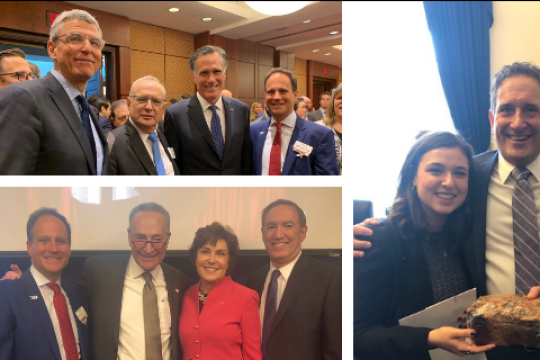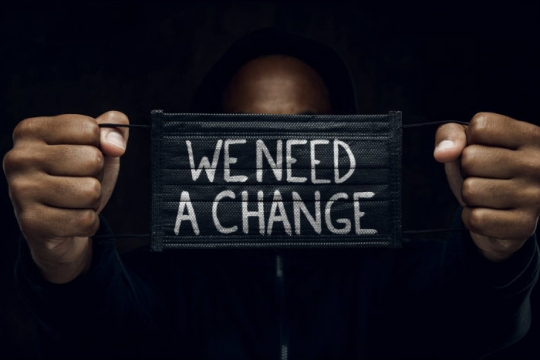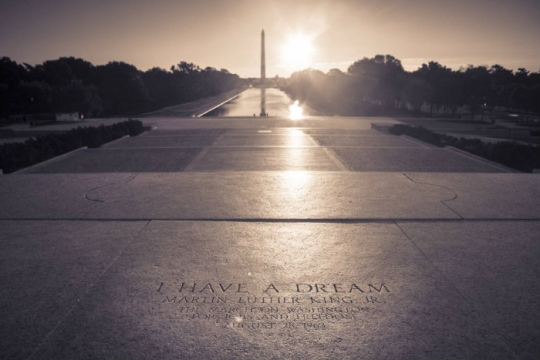This post is adapted from Rabbi Weisman's Rosh HaShanah 5779 morning sermon.
Voting is the quintessential American act. Our Founding Fathers envisioned a nation in which We The People were ultimately at the helm, their chosen delegates entrusted to fulfill the will of the public. As James Madison wrote in The Federalist Papers #57, responding to the question of who, ultimately, should be the voting public: “Not the rich, more than the poor; not the learned, more than the ignorant; not the haughty heirs of distinguished names, more than the humble sons of obscurity and unpropitious fortune. The electors are to be the great body of the people of the United States.”
When we vote, we bring our individual self into the communal conversation. Voting is at its core a personal right, but when we vote, we enhance our cities and towns, states, and our nation by adding our own voice, our wisdom and our experience to the collective of those around us. Every citizen has the right to choose who they think is the best person for the job, and use any qualifications she or he deems necessary. Living in a republic, we don’t actually get to make the laws for our country or make the decisions that will impact our future; we just get to choose the people who will do that for us. The opportunity for us to do that only comes about every few years, and the impact of that decision continues until the next election, and often even longer than that.
Voting is particularly meaningful to us as Jews. We have not always had it this good. For most of the last two thousand years we were ignored and persecuted, if not outright threatened or worse. Our local governments only deigned contact us when they needed something, and usually just took it. But not in America. In America we have always been part of the voting public, as George Washington envisioned when he wrote to the Hebrew Congregation in Newport, Rhode Island: “May the children of the stock of Abraham who dwell in this land continue to merit and enjoy the good will of the other inhabitants — while every one shall sit in safety under his own vine and fig tree and there shall be none to make him afraid.” Our success as a people here in the U.S. is what drew so many of our ancestors here when they were able to flee those other places: they sought the warm embrace of a nation that would not discriminate against them because of our religion.
Engaging in the political climate is something that is a part of who we are. Moses tasked the tribes to appoint chieftains and heads of households, creating an infrastructure and delegation so that the concerns of each individual had an ear that could hear them. The rabbis of the Talmud beseeched us with the instruction that “A ruler is not to be selected unless the community is first consulted” (Brachot 55a). The rabbis of the Talmud might not have been able to imagine a robust representative democracy like modern America, but even through the blinders of their own oppression they recognized the value in representative governance. As their spiritual descendants, who inherited not only their wisdom but the good fortune to be born in this country in our time, we ought to be deeply appreciative of our opportunities. As a minority in this community- a minority with the memories of oppression from ancient and more contemporary times- we ought to be even more celebratory of this opportunity to vote, and show our celebration by exercising that right as often as possible and ensuring it for others as well, like Desmond Meade.
Desmond Meade is a citizen of Florida who does not have the right to vote. Desmond served in our nation’s armed forces, but after his service became addicted to drugs, a reality that affects too many of our women and men in uniform, and is on the rise. He ultimately was convicted of a firearms charge, a felony, and sent to prison. After his release, while living in a homeless shelter, Desmond began his path towards his earning his bachelor’s degree. Ultimately, not only did he receive his bachelor’s, he went on to graduate from Florida International University’s law school. He did what we wish everyone who finds themselves leaving prison would do: he turned his life around, went to school, and now finds himself with the opportunity to be a productive member of society, and then some. But, because of his felony conviction, he cannot sit for the bar and practice law, could not vote for his wife when she ran for public office, and he cannot be summonsed for jury service.
Currently, Florida is one of only 4 states that does not automatically restore voting rights to people who have been convicted of a felony. In Florida, someone with a felony on their record has to complete their sentence, including incarceration, fines or restitution, parole, and probation, and then wait seven years before they can petition the state clemency board to restore their civil rights. This 4-person panel made up of the governor, attorney general, CFO, and Agriculture commissioner has no criteria for who should or should not have their rights restored; the decision rests with those four individuals and they are accountable to nobody. Today there are 1.4 million Floridians who cannot vote. In the past seven and a half years, only 3,000 have had their rights restored. Tens of thousands are on the waiting list to be heard, and many others see their chance of success as so slim that they do not apply.
On the ballot this November is Amendment 4, a change to the Florida Constitution which would automatically restore voting rights for felons in this state once they have completed the entirety of their sentence: incarceration, restitution, parole, probation- whatever the court system judges is the appropriate punishment for their crimes. It would address the needs of those 1.4 million Floridians, and include them in the voting public once again.
This issue of public concern rests at the heart of what Rosh HaShanah and our High Holy Day period represents, transgression and repentance. On this day, we are told our past deeds are recalled by the Holy One, and our fate is decided. During this season, we are asked to do teshuva, that serious introspection where we evaluate ourselves and resolve for self-improvement in the year to come. We also challenge ourselves to accept the apology, regret, and the repentance of those around us. If we wish to have our pleas accepted, if we wish for the opportunity to right the wrongs we have done and make amends with those around us, we must make room for others to do the same. If we ask the Holy One for a second chance, to be renewed for life in the year to come, we owe it to our fellow citizens to be willing to offer the same.
Our tradition speaks time and time again of sin and repentance, of transgression and forgiveness, and ultimately of the welcoming back into the community of the one who has gone astray. In the Torah, as the Israelites were making their way from Egypt to Israel, Miriam and Aaron, Moses’ siblings, committed a sin. They offended their brother and his wife by questioning her fitness to be his wife, an account of her Cushite heritage. As punishment, Miriam was stricken with a skin affliction. Moses, a man of great humility, saw past the offense, and called out: "O God, please heal her!" And God did so. Moses forgave his sister and brother for their transgression. God required that Miriam be cut off from the community for a period of days. But while she was healing and serving her time of separation, the community did not move forward without her (Numbers 12:1-15). As this episode demonstrates, even when a transgression is so grave as to warrant physical separation from the community, not unlike incarceration, we do not cast aside indefinitely those who have committed transgressions. Instead, we encourage ourselves and our communities to engage with those who have sinned, to bring them back into the fold.
How to treat the person who has completed their repentance was something our rabbis taught us as well. The Talmud instructs us: “He who has done teshuva, one should not say to him, ‘Remember your earlier deeds’” (Baba Metzia 58b). The one who has gone to the lengths of making amends, of making apology, of resolving to do better in the future and who stays away from further transgression, we ought not remind him of his previous misdeeds.
Felony disenfranchisement serves as just such a reminder. That reminder comes when everyone else goes to vote in November. It comes in the weeks and months of each election season. It comes every time an elected official is on TV, every time one confronts a law or policy that one might want to see changed. We have the opportunity to remove that reminder, and to expand the depth of civic engagement by our fellow Floridians. We have the chance to make our state better- better for all of its citizens and better as a society. Our tradition teaches that it is not fair that we withhold civil rights from those who have committed a felony. They are our neighbors and friends. Members of our families. They are sitting in the congregation today. Once they have fulfilled their debt to society, they are square with us. We are not square with them, and we can fix that. It is our act of teshuva.
Rabbi Greg Weisman serves at Temple Beth El of Boca Raton. To learn more about Amendment 4 and how you can get involved in the fight to restore voting rights to 1.4 million Floridians (regardless of if you live in Florida or not), visit the RAC's Civic Engagement Campaign.
Related Posts

RAC Legislative Priorities for the 117th Congress

Justice, Justice Shall We Pursue: Resources for Action after the Capitol Insurrection

